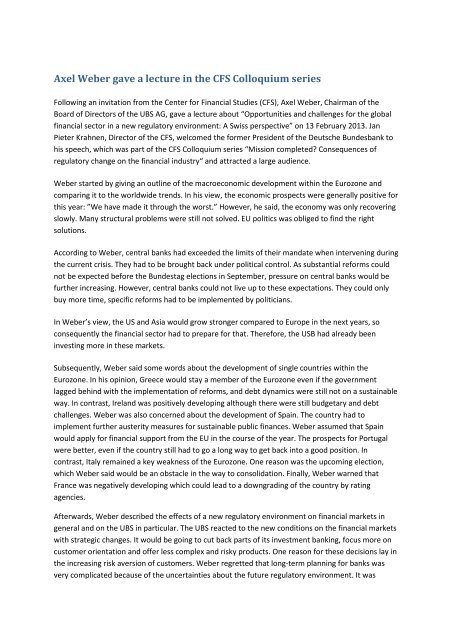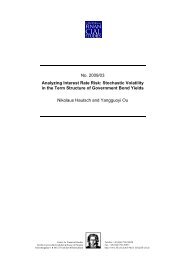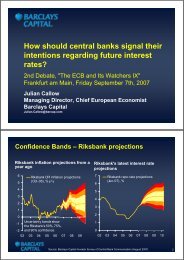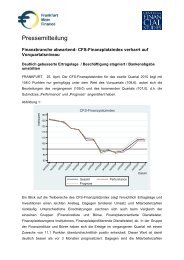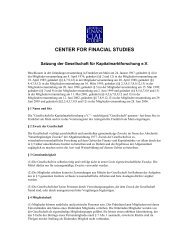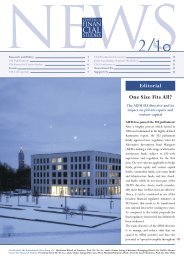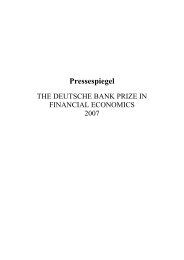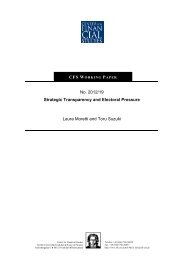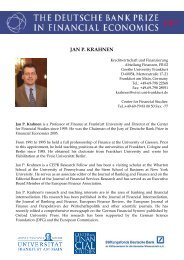Axel Weber gave a lecture in the CFS Colloquium series - Center for ...
Axel Weber gave a lecture in the CFS Colloquium series - Center for ...
Axel Weber gave a lecture in the CFS Colloquium series - Center for ...
You also want an ePaper? Increase the reach of your titles
YUMPU automatically turns print PDFs into web optimized ePapers that Google loves.
<strong>Axel</strong> <strong>Weber</strong> <strong>gave</strong> a <strong>lecture</strong> <strong>in</strong> <strong>the</strong> <strong>CFS</strong> <strong>Colloquium</strong> <strong>series</strong><br />
Follow<strong>in</strong>g an <strong>in</strong>vitation from <strong>the</strong> <strong>Center</strong> <strong>for</strong> F<strong>in</strong>ancial Studies (<strong>CFS</strong>), <strong>Axel</strong> <strong>Weber</strong>, Chairman of <strong>the</strong><br />
Board of Directors of <strong>the</strong> UBS AG, <strong>gave</strong> a <strong>lecture</strong> about “Opportunities and challenges <strong>for</strong> <strong>the</strong> global<br />
f<strong>in</strong>ancial sector <strong>in</strong> a new regulatory environment: A Swiss perspective” on 13 February 2013. Jan<br />
Pieter Krahnen, Director of <strong>the</strong> <strong>CFS</strong>, welcomed <strong>the</strong> <strong>for</strong>mer President of <strong>the</strong> Deutsche Bundesbank to<br />
his speech, which was part of <strong>the</strong> <strong>CFS</strong> <strong>Colloquium</strong> <strong>series</strong> “Mission completed? Consequences of<br />
regulatory change on <strong>the</strong> f<strong>in</strong>ancial <strong>in</strong>dustry“ and attracted a large audience.<br />
<strong>Weber</strong> started by giv<strong>in</strong>g an outl<strong>in</strong>e of <strong>the</strong> macroeconomic development with<strong>in</strong> <strong>the</strong> Eurozone and<br />
compar<strong>in</strong>g it to <strong>the</strong> worldwide trends. In his view, <strong>the</strong> economic prospects were generally positive <strong>for</strong><br />
this year: ”We have made it through <strong>the</strong> worst.” However, he said, <strong>the</strong> economy was only recover<strong>in</strong>g<br />
slowly. Many structural problems were still not solved. EU politics was obliged to f<strong>in</strong>d <strong>the</strong> right<br />
solutions.<br />
Accord<strong>in</strong>g to <strong>Weber</strong>, central banks had exceeded <strong>the</strong> limits of <strong>the</strong>ir mandate when <strong>in</strong>terven<strong>in</strong>g dur<strong>in</strong>g<br />
<strong>the</strong> current crisis. They had to be brought back under political control. As substantial re<strong>for</strong>ms could<br />
not be expected be<strong>for</strong>e <strong>the</strong> Bundestag elections <strong>in</strong> September, pressure on central banks would be<br />
fur<strong>the</strong>r <strong>in</strong>creas<strong>in</strong>g. However, central banks could not live up to <strong>the</strong>se expectations. They could only<br />
buy more time, specific re<strong>for</strong>ms had to be implemented by politicians.<br />
In <strong>Weber</strong>’s view, <strong>the</strong> US and Asia would grow stronger compared to Europe <strong>in</strong> <strong>the</strong> next years, so<br />
consequently <strong>the</strong> f<strong>in</strong>ancial sector had to prepare <strong>for</strong> that. There<strong>for</strong>e, <strong>the</strong> USB had already been<br />
<strong>in</strong>vest<strong>in</strong>g more <strong>in</strong> <strong>the</strong>se markets.<br />
Subsequently, <strong>Weber</strong> said some words about <strong>the</strong> development of s<strong>in</strong>gle countries with<strong>in</strong> <strong>the</strong><br />
Eurozone. In his op<strong>in</strong>ion, Greece would stay a member of <strong>the</strong> Eurozone even if <strong>the</strong> government<br />
lagged beh<strong>in</strong>d with <strong>the</strong> implementation of re<strong>for</strong>ms, and debt dynamics were still not on a susta<strong>in</strong>able<br />
way. In contrast, Ireland was positively develop<strong>in</strong>g although <strong>the</strong>re were still budgetary and debt<br />
challenges. <strong>Weber</strong> was also concerned about <strong>the</strong> development of Spa<strong>in</strong>. The country had to<br />
implement fur<strong>the</strong>r austerity measures <strong>for</strong> susta<strong>in</strong>able public f<strong>in</strong>ances. <strong>Weber</strong> assumed that Spa<strong>in</strong><br />
would apply <strong>for</strong> f<strong>in</strong>ancial support from <strong>the</strong> EU <strong>in</strong> <strong>the</strong> course of <strong>the</strong> year. The prospects <strong>for</strong> Portugal<br />
were better, even if <strong>the</strong> country still had to go a long way to get back <strong>in</strong>to a good position. In<br />
contrast, Italy rema<strong>in</strong>ed a key weakness of <strong>the</strong> Eurozone. One reason was <strong>the</strong> upcom<strong>in</strong>g election,<br />
which <strong>Weber</strong> said would be an obstacle <strong>in</strong> <strong>the</strong> way to consolidation. F<strong>in</strong>ally, <strong>Weber</strong> warned that<br />
France was negatively develop<strong>in</strong>g which could lead to a downgrad<strong>in</strong>g of <strong>the</strong> country by rat<strong>in</strong>g<br />
agencies.<br />
Afterwards, <strong>Weber</strong> described <strong>the</strong> effects of a new regulatory environment on f<strong>in</strong>ancial markets <strong>in</strong><br />
general and on <strong>the</strong> UBS <strong>in</strong> particular. The UBS reacted to <strong>the</strong> new conditions on <strong>the</strong> f<strong>in</strong>ancial markets<br />
with strategic changes. It would be go<strong>in</strong>g to cut back parts of its <strong>in</strong>vestment bank<strong>in</strong>g, focus more on<br />
customer orientation and offer less complex and risky products. One reason <strong>for</strong> <strong>the</strong>se decisions lay <strong>in</strong><br />
<strong>the</strong> <strong>in</strong>creas<strong>in</strong>g risk aversion of customers. <strong>Weber</strong> regretted that long-term plann<strong>in</strong>g <strong>for</strong> banks was<br />
very complicated because of <strong>the</strong> uncerta<strong>in</strong>ties about <strong>the</strong> future regulatory environment. It was
important to regulate f<strong>in</strong>ancial markets globally <strong>in</strong> order to create a level play<strong>in</strong>g field <strong>for</strong> banks that<br />
operate worldwide.<br />
<strong>Weber</strong> criticized plans <strong>for</strong> a separation of <strong>in</strong>vestment and commercial banks. There was no empirical<br />
evidence that universal banks were part of <strong>the</strong> problem <strong>in</strong> <strong>the</strong> f<strong>in</strong>ancial sector. On <strong>the</strong> contrary,<br />
specialized banks, like Lehman Bro<strong>the</strong>rs, had failed.<br />
<strong>Weber</strong> called <strong>for</strong> coord<strong>in</strong>at<strong>in</strong>g <strong>the</strong> <strong>in</strong>troduction of regulatory measures with <strong>the</strong> economic<br />
development. In this respect, it was a good decision to <strong>in</strong>troduce Basel III step by step until 2019. The<br />
UBS was an early mover as regards <strong>the</strong> implementation of <strong>the</strong> new regulatory framework. It had<br />
early adjusted to <strong>the</strong> new capital requirements. Now, politics had to work on standardiz<strong>in</strong>g <strong>the</strong> level<br />
play<strong>in</strong>g field <strong>for</strong> all banks. O<strong>the</strong>rwise, adjust<strong>in</strong>g quickly could result to be a disadvantage <strong>for</strong> <strong>the</strong> UBS.<br />
After <strong>the</strong> <strong>lecture</strong>, <strong>Weber</strong> was asked about <strong>the</strong> greatest threat <strong>for</strong> a susta<strong>in</strong>able f<strong>in</strong>ancial architecture<br />
<strong>in</strong> Europe. In his op<strong>in</strong>ion, this was <strong>the</strong> loose monetary policy at present. It risked <strong>in</strong>creas<strong>in</strong>g <strong>in</strong>flation,<br />
which would cause particular problems <strong>for</strong> <strong>the</strong> poorer population. <strong>Weber</strong> also feared that bubbles<br />
could arise on f<strong>in</strong>ancial markets because of <strong>the</strong> loose monetary policy which could cause a new crisis.<br />
The crisis, he said, was like a chameleon: it always changes its appearance.


